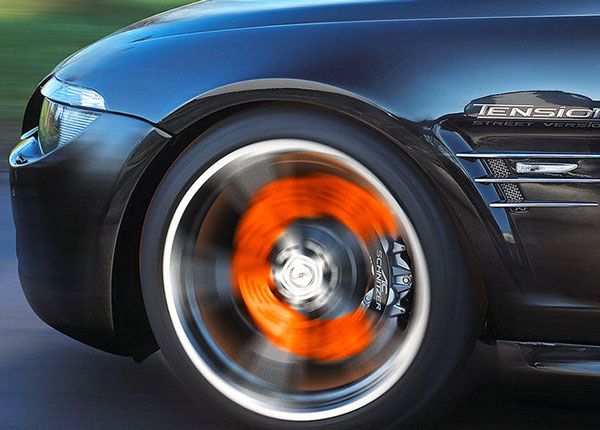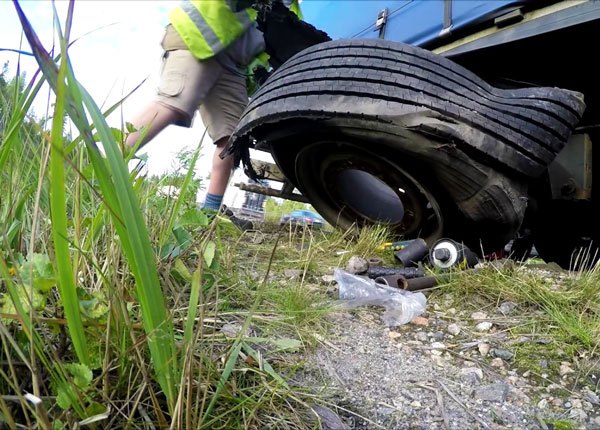
Handling Brake Failure: Common Causes, Warning Signals & What To Do
Updated Dec. 29, 2020If you look after your vehicle and have your brakes serviced regularly, it is unlikely you will ever experience the terror that accompanies brake failure. As with any vehicle malfunction, the key to surviving a brake failure while driving is not to panic. The advice we offer in this module will help you understand the causes of brake failure and what to do, should it ever happen to you.
If any single component of your braking system malfunctions, the entire system may cease to work correctly. Fortunately, most modern cars operate with a split-brake system, making it very unlikely that all four brakes will fail at the same time.
Total brake failure
Some older passenger vehicles operate with a single braking system. This means that if the system fails, you will no longer have any braking ability. Partial brake fails are more common, thanks to modern split-system passenger vehicles.
When you experience a partial brake failure you will have reduced braking ability; usually, one front-wheel and one rear-wheel brake are lost. This will give you enough control to slow your vehicle and pull over to the side of the road. Do not continue driving with a partial brake failure. Your vehicle is unsafe and must be repaired before you may drive it again.
What to do when your brakes fail
Keep a cool head when your brakes fail, and you may be able to get them working again. At the very least, there are steps you can take to avoid a collision and stop the vehicle safely. If your brake pedal sinks to the floor and your brakes stop working, follow these steps:
- 1

Pump the brake pedal hard, several times.
This will often build enough pressure to regain partial braking ability and slow the vehicle. DO NOT try this step when driving a vehicle with anti-lock brakes (ABS). - 2

Drop into a lower gear.
This will help to reduce your speed. - 3

It is time to use your parking brake.
Engage the parking brake slowly to avoid locking the rear-wheels, ease off and re-apply if wheel-locking occurs. - 4

If the parking brake has not brought your vehicle to a stop, drop into the lowest gear.
This should only be considered as a last resort, as it will likely damage your transmission. Steer your car safely off the roadway.
If you cannot slow your vehicle rapidly enough to avoid a collision, consider turning instead. It is usually quicker to turn your vehicle than it is to stop it. However, you should not turn if doing so will put you or other road users in even greater jeopardy.
Be sure to sound your horn and flash your lights to warn other drivers as you attempt to avoid an accident. Keep both hands firmly on the steering wheel as you turn or change lanes, as you will need maximum control over the vehicle. If an accident cannot be avoided, try steering your vehicle into something soft, like a line of bushes.
Wet brakes
Moisture build-up on your brakes can act as a lubricant and cause temporary brake failure. Unlike other brake malfunctions, this type of brake failure will right itself as soon as your brakes have dried. Always test your brakes after driving through deep water, or intermittently when driving in heavy rain. If the brakes are wet, they may pull to one side or not work at all.
Wet brakes can be dried by gentle pulsing the brake pedal while the car is in a low gear. This will shake off any excess moisture preventing the brakes from catching. You can repeat this drying technique every 200 ft or so until the brakes have returned to normal.
Symptoms of brake failure
Get your car checked right away if you notice the brake pedal feeling softer, or “spongy”. Stop the vehicle at the next safe opportunity and do not drive it again until the brakes have been given the all-clear by a certified mechanic. Spongy brakes are usually an early warning sign that your brakes may partially or totally fail. Other symptoms of an impending brake failure include:
- Screeching, scraping, or grinding noises when the brakes are applied.
- The brake light on the dashboard is permanently on.
- Fluid leaking from the brakes.
- A burning smell during or after brake application.
- The car pulls slightly to one side when the brakes are applied.
Causes of brake failure
Drivers who understand what can lead to a brake malfunction have a better chance of avoiding brake failure. Brake failure can be caused by:
- Overheated or worn brake pads. Strange noises when you brake can be an indication of this.
- Fluid leakage. This is one of the most common causes of brake failure.
- Rusted brake lines.
- A fault with the ABS modulator (in vehicles with an Anti-lock Braking System).
Getting a professional to give your car a regular health check should prevent any of these issues leading to partial or total brake failure.
Avoiding brake failure
The way you drive your car could be damaging your brakes. Excessive braking by applying the brake too hard or too frequently is the main driving issue that leads to brake failure, particularly when traveling on a decline. Braking repeatedly on a downhill slope rather than using one, slow and controlled motion can overheat your brakes and cause them to “crystallize” or harden.
When brake pads overheat and harden, they will no longer have the necessary grip to slow and stop your wheels efficiently. Avoiding misuse of the brakes and getting regular services should keep them in full working order for the lifespan of your vehicle.
Parking brake failure
If you do not use your parking brake regularly, corrosion on the brake cable can render it ineffective. Forgetting to disengage the parking brake is also a common problem for many drivers. This will lead to premature wear, overheating and in time, parking brake failure.
Parking brakes are often overlooked, as modern vehicles are built with an automatic wheel-locking system that engages when the car is parked. Nonetheless, it is a legal requirement in many states for the parking brake or emergency brake to be engaged on a parked vehicle. Plus, the parking brake may be your only hope if your regular brakes fail. Therefore, it needs to be kept in good working order.




